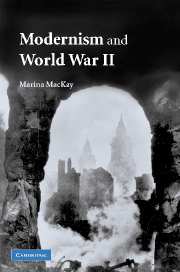Book contents
- Frontmatter
- Contents
- Acknowledgements
- Introduction: Modernism beyond the Blitz
- Chapter 1 Virginia Woolf and the pastoral patria
- Chapter 2 Rebecca West's anti-Bloomsbury group
- Chapter 3 The situational politics of Four Quartets
- Chapter 4 The neutrality of Henry Green
- Chapter 5 Evelyn Waugh and the ends of minority culture
- Coda: National historiography after the post-war settlement
- Notes
- Bibliography
- Index
Chapter 3 - The situational politics of Four Quartets
Published online by Cambridge University Press: 22 September 2009
- Frontmatter
- Contents
- Acknowledgements
- Introduction: Modernism beyond the Blitz
- Chapter 1 Virginia Woolf and the pastoral patria
- Chapter 2 Rebecca West's anti-Bloomsbury group
- Chapter 3 The situational politics of Four Quartets
- Chapter 4 The neutrality of Henry Green
- Chapter 5 Evelyn Waugh and the ends of minority culture
- Coda: National historiography after the post-war settlement
- Notes
- Bibliography
- Index
Summary
You will be astonished to find how like art is to war. I mean ‘modernist’ art. … I have set out to show how war, art, civil war, strikes and coup d'états dovetail into each other.
Wyndham Lewis, Blasting and Bombardiering (1937)War is not a life: it is a situation,
One which may neither be ignored nor accepted
T. S. Eliot, ‘A Note on War Poetry’ (1942)Published on T. S. Eliot's seventy-fifth birthday, and the product of the poet's own sifting and salvaging, Collected Poems 1909–1962 offers illuminating insights into how Eliot viewed his career in its closing years. The last major work in the collection is Four Quartets, the sequence of poems that started in the mid-1930s with Burnt Norton, the poem which developed the model for those Eliot wrote in wartime: East Coker (1940), The Dry Salvages (1941) and Little Gidding (1942). But these are not the four last things the reader encounters in the Collected Poems; they have a postscript in the group of ‘Occasional Verses’ at the very end of the book. A poem written in celebration of Walter de la Mare's seventy-fifth birthday has a self-referential flavour; by far the best known of the five is Eliot's closing dedication to his wife; and the remaining three occasional poems are propaganda from the Second World War: ‘Defense of the Islands’ (1941), ‘A Note on War Poetry’ (1942) and ‘To the Indians Who Died in Africa’ (1943).
- Type
- Chapter
- Information
- Modernism and World War II , pp. 71 - 90Publisher: Cambridge University PressPrint publication year: 2007



